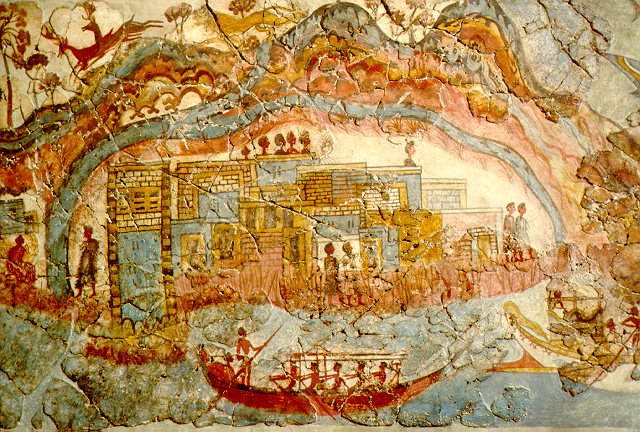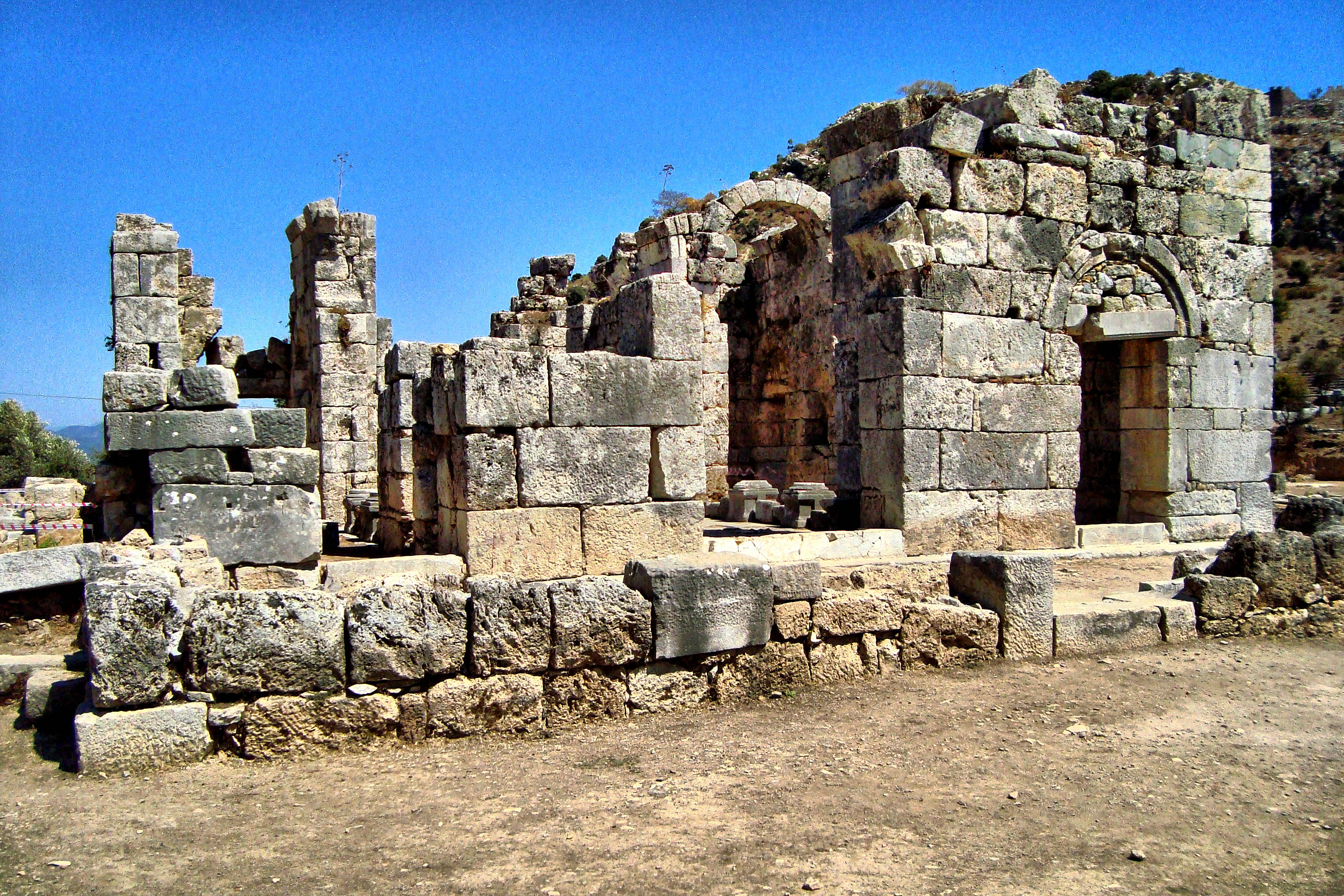|
Patroclus (admiral)
Patroclus ( grc, Πάτροκλος), also spelled Patroklos, was a leading official and admiral of the Ptolemaic Kingdom. He is best known for his activity during the Chremonidean War (267–261 BC), when he commanded the Ptolemaic navy, navy sent to Ancient Greece, Greece by Ptolemy II Philadelphus, Ptolemy II. His early career is obscure, but it must have been distinguished enough for him to rise to the Ptolemaic cult of Alexander the Great, chief priesthood of Alexander and the Theoi Adelphoi in 271/270 BC. After the outbreak of the Chremonidean War, he led a diplomatic and military expedition to the Aegean Sea that expanded Ptolemaic control by establishing bases at Crete, Ceos, Thera, Attica and the Argolid. From these bases he tried, without much success, to aid the Classical Athens, Athenians against Antigonus II Gonatas, King of Macedon. He may have been the defeated Ptolemaic commander at the Battle of Cos, which marked the end of Ptolemaic thalassocracy. Early life and ... [...More Info...] [...Related Items...] OR: [Wikipedia] [Google] [Baidu] |
Thalassocracy
A thalassocracy or thalattocracy sometimes also maritime empire, is a state with primarily maritime realms, an empire at sea, or a seaborne empire. Traditional thalassocracies seldom dominate interiors, even in their home territories. Examples of this were the Phoenician states of Tyre, Sidon and Carthage, and the Italian maritime republics of Venice and Genoa of the Mediterranean; the Chola dynasty of India and the Austronesian states of Srivijaya, the Omani Empire and Majapahit of Maritime Southeast Asia. Thalassocracies can thus be distinguished from traditional empires, where a state's territories, though possibly linked principally or solely by the sea lanes, generally extend into mainland interiors in a tellurocracy ("land-based hegemony"). The term ''thalassocracy'' can also simply refer to naval supremacy, in either military or commercial senses. The Ancient Greeks first used the word ''thalassocracy'' to describe the government of the Minoan civilization, whose power ... [...More Info...] [...Related Items...] OR: [Wikipedia] [Google] [Baidu] |
Viceroy
A viceroy () is an official who reigns over a polity in the name of and as the representative of the monarch of the territory. The term derives from the Latin prefix ''vice-'', meaning "in the place of" and the French word ''roy'', meaning "king". He has also been styled the king's lieutenant. A viceroy's territory may be called a viceroyalty, though this term is not always applied. The adjective form is ''viceregal'', less often ''viceroyal''. The term ''vicereine'' is sometimes used to indicate a female viceroy ''suo jure'', although ''viceroy'' can serve as a gender-neutral term. Vicereine is more commonly used to indicate a viceroy's wife. The term has occasionally been applied to the governors-general of the Commonwealth realms, who are ''viceregal'' representatives of the monarch. ''Viceroy'' is a form of royal appointment rather than noble rank. An individual viceroy often also held a noble title, however, such as Bernardo de Gálvez, 1st Viscount of Galveston, who was ... [...More Info...] [...Related Items...] OR: [Wikipedia] [Google] [Baidu] |
William Woodthorpe Tarn
Sir William Woodthorpe Tarn (26 February 1869 – 7 November 1957) was a British classics, classical scholar and a writer. He wrote extensively on the Hellenistic world, particularly on Alexander the Great, Alexander the Great's empire and its successor states. Life William Woodthorpe Tarn was born in London on the 26 of February 1869, eldest of two sons and one daughter of William Tarn (b. 1841/2), a silk merchant, and Frances Arthy (b. 1843/4). He studied at Eton College, where he was school captain and a king's scholar, graduating in 1888. He studied at Trinity College, Cambridge with Henry Jackson (classicist), Henry Jackson, sparking a lifelong interest in Greek philosophy. He then studied law at the Inner Temple, becoming a chancery barrister in 1894. In 1896 he married Flora Macdonald (d. 1937). He had one daughter, Otta, for whom he wrote a fairy story, ''The Treasure of the Isle of Mist'' (1919). Following the long illness of Flora, Tarn had a breakdown and retired from ... [...More Info...] [...Related Items...] OR: [Wikipedia] [Google] [Baidu] |
Nauarchos
Navarch ( el, ναύαρχος, ) is an Anglicisation of a Greek word meaning "leader of the ships", which in some states became the title of an office equivalent to that of a modern admiral. Historical usage Not all states gave their naval commanders such a title. Athens, for instance, placed its fleet under the command of generals (''strategoi'') holding the same title as those who commanded its land forces. Such command structures reflected the fact that, especially early in the Classical period, fleets operated in close conjunction with land forces, and indeed, the title of navarch did not begin to appear until the time of the Peloponnesian War, when fleets began to operate more independently. This separate title was originally used in cities that lacked an established naval tradition, Sparta being the most prominent, but entered broader use later, being adopted by the navies of the Hellenistic period states such as Macedon, Syracuse, the Ptolemaic Kingdom, the Seleucid ... [...More Info...] [...Related Items...] OR: [Wikipedia] [Google] [Baidu] |
Kaunos
Kaunos (Carian: ''Kbid'';. Translator Chris Markham. Lycian: ''Khbide''; Ancient Greek: ; la, Caunus) was a city of ancient Caria and in Anatolia, a few kilometres west of the modern town of Dalyan, Muğla Province, Turkey. The Calbys river (now known as the Dalyan river) was the border between Caria and Lycia. Initially Kaunos was a separate state; then it became a part of Caria and later still of Lycia. Kaunos was an important sea port, the history of which is supposed to date back to the 10th century BC. Because of the formation of İztuzu Beach and the silting of the former Bay of Dalyan (from approx. 200 BC onwards), Kaunos is now located about 8 km from the coast.Köyceğiz-Dalyan, a journey through history within the labyrinth of nature; Altan Türe; 2011; Faya Kültür Yayınları-1; The city had two ports, the southern port at the southeast of ''Küçük Kale'' and the inner port at its northwest (the present ''Sülüklü Göl'', Lake of the Leeches). T ... [...More Info...] [...Related Items...] OR: [Wikipedia] [Google] [Baidu] |
Alexandria
Alexandria ( or ; ar, ٱلْإِسْكَنْدَرِيَّةُ ; grc-gre, Αλεξάνδρεια, Alexándria) is the second largest city in Egypt, and the largest city on the Mediterranean coast. Founded in by Alexander the Great, Alexandria grew rapidly and became a major centre of Hellenic civilisation, eventually replacing Memphis, in present-day Greater Cairo, as Egypt's capital. During the Hellenistic period, it was home to the Lighthouse of Alexandria, which ranked among the Seven Wonders of the Ancient World, as well as the storied Library of Alexandria. Today, the library is reincarnated in the disc-shaped, ultramodern Bibliotheca Alexandrina. Its 15th-century seafront Qaitbay Citadel is now a museum. Called the "Bride of the Mediterranean" by locals, Alexandria is a popular tourist destination and an important industrial centre due to its natural gas and oil pipelines from Suez. The city extends about along the northern coast of Egypt, and is the largest city on t ... [...More Info...] [...Related Items...] OR: [Wikipedia] [Google] [Baidu] |
Incest
Incest ( ) is human sexual activity between family members or close relatives. This typically includes sexual activity between people in consanguinity (blood relations), and sometimes those related by affinity (marriage or stepfamily), adoption, or lineage. It is strictly forbidden and considered immoral in most societies, and can lead to an increased risk of genetic disorders in children. The incest taboo is one of the most widespread of all cultural taboos, both in present and in past societies. Most modern societies have laws regarding incest or social restrictions on closely consanguineous marriages. In societies where it is illegal, consensual adult incest is seen by some as a victimless crime. Some cultures extend the incest taboo to relatives with no consanguinity such as milk-siblings, step-siblings, and adoptive siblings, albeit sometimes with less intensity. Third-degree relatives (such as half-aunt, half-nephew, first cousin) on average have 12.5% common genetic heri ... [...More Info...] [...Related Items...] OR: [Wikipedia] [Google] [Baidu] |
Sotades
Sotades ( el, Σωτάδης; 3rd century BC) was an Ancient Greek literature#Hellenistic poetry, Ancient Greek poet. Biography Sotades was born in Maroneia, either the one in Thrace, or in Crete. He lived in History of Alexandria#Ptolemaic era, Alexandria during the reign of Ptolemy II Philadelphus (285–246 BC). Alexandrian school, The city was at that time a remarkable center of learning, with a great deal of artistic and literary activity, including epic poetry and the Library of Alexandria, Great Library. Only a few genuine fragments of his work have been preserved; those in Stobaeus are generally considered spurious. Ennius translated some poems of this kind, included in his book of satires under the name of Sola. He had a son named Apollonius (son of Sotades), Apollonius. He has been credited with the invention of the palindrome. Sotades was the chief representative of the writers of obscenity, obscene and even pederasty, pederastic satire, satirical poetry, poems, called ... [...More Info...] [...Related Items...] OR: [Wikipedia] [Google] [Baidu] |
Alexander The Great
Alexander III of Macedon ( grc, wikt:Ἀλέξανδρος, Ἀλέξανδρος, Alexandros; 20/21 July 356 BC – 10/11 June 323 BC), commonly known as Alexander the Great, was a king of the Ancient Greece, ancient Greek kingdom of Macedonia (ancient kingdom), Macedon. He succeeded his father Philip II of Macedon, Philip II to the throne in 336 BC at the age of 20, and spent most of his ruling years conducting a lengthy military campaign throughout Western Asia and ancient Egypt, Egypt. By the age of thirty, he had created one of the List of largest empires, largest empires in history, stretching from Greece to northwestern Historical India, India. He was undefeated in battle and is widely considered to be one of history's greatest and most successful military commanders. Until the age of 16, Alexander was tutored by Aristotle. In 335 BC, shortly after his assumption of kingship over Macedon, he Alexander's Balkan campaign, campaigned in the Balkans and reasserted control ... [...More Info...] [...Related Items...] OR: [Wikipedia] [Google] [Baidu] |
Deified
Apotheosis (, ), also called divinization or deification (), is the glorification of a subject to divine levels and, commonly, the treatment of a human being, any other living thing, or an abstract idea in the likeness of a deity. The term has meanings in theology, where it refers to a belief, and in art, where it refers to a genre. In theology, ''apotheosis'' refers to the idea that an individual has been raised to godlike stature. In art, the term refers to the treatment of any subject (a figure, group, locale, motif, convention or melody) in a particularly grand or exalted manner. Ancient Near East Before the Hellenistic period, imperial cults were known in Ancient Egypt (pharaohs) and Mesopotamia (from Naram-Sin through Hammurabi). In the New Kingdom of Egypt, all deceased pharaohs were deified as the god Osiris. The architect Imhotep was deified after his death. Ancient Greece From at least the Geometric period of the ninth century BC, the long-deceased heroes li ... [...More Info...] [...Related Items...] OR: [Wikipedia] [Google] [Baidu] |




